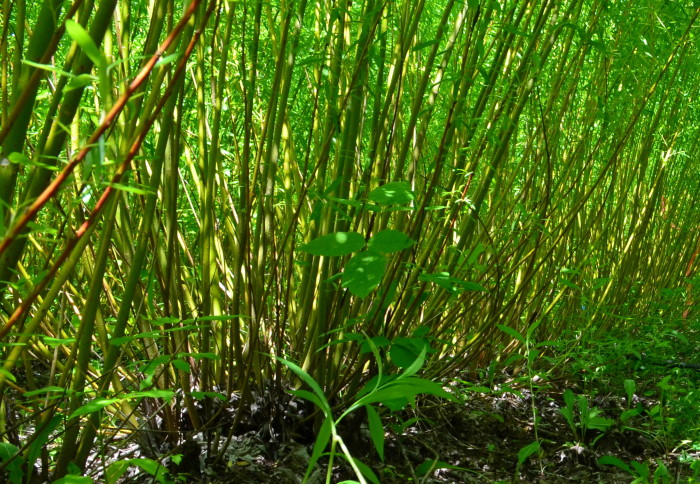Willow, a green treatment plant turns sewage from dirty to desirable
by Simon Levey

Willows growing in a experimental sewage plant in Quebec, Canada
Natural filtration by willow trees could be the answer to a growing waste problem, producing clean water, renewable biofuels and 'green' chemicals.
The United Kingdom has long been a trailblazer in sewage treatment, with Bazalgette’s London sewer system, completed in 1875, and the activated sludge process for treating wastewater developed in Manchester in 1914. Today, 98% of UK homes are now connected to the national sewerage system.
However, in countries such as Canada, six trillion litres of municipal wastewater are partially treated and released into the environment each year, while another 150 billion litres of untreated sewage are discharged straight into pristine surface waters.
Now, researchers have found a way to stem that flow: by filtering the waste through the roots of willow trees. They estimate that over 30 million litres of primary wastewater per hectare can be treated using 'bio-refinery' annually, based on experiments in Saint-Roch-de-l'Achigan in Quebec, Canada. The volume would be different in another country depending on the local environment.
Their results were published in the journal Science of the Total Environment by a team at Université de Montréal in Canada and Imperial College London in the UK.

Louis Hennequin, postgraduate researcher in the Department of Chemical Engineering at Imperial College London, and co-author of the research, says: "What’s exciting about this work is how multiple fields of research can be combined as part of 'biorefinery'."
"I’m interested in how we can use natural biological systems, advanced chemical engineering and green technologies to harness to meet environmental challenges. We're only at the start of developing such solutions to help improve the environment but I think they are very much within reach."
Hennequin, who is studying for a PhD as part of the NERC Science and Solutions for a Changing Planet DTP at Imperial, talks about the results of the research and his experience of this transatlantic connection during the Covid-19 pandemic below.
Willows produce renewable biofuels
Fast-growing willow trees are cultivated widely across the UK, destined to become renewable biofuels, alternative to fossil fuels for motor vehicles, heating systems and industry.
Sugars can be extracted from the cell walls of willow trees, to ferment and turn into 'bioethanol', a biofuel, or for 'green chemistry', for example to make plastics such as polyethylene.
"We have been developing ionic liquid technologies to treat biomass from dedicated bioenergy crops such as willow in the Hallett Group at Imperial, so I was confident that we could achieve high yields from willow biomass," explains Hennequin.

Willows are fast growing, naturally tolerant of contamination and their roots filter out the high nitrogen in sewage -- potentially on land where they would not be competing with food crops for space.
Previous studies have shown that biofuels could provide up to a fifth of global energy without damaging food production and Imperial researchers, among others, have recommended that countries from the United States to Brazil add more biofuel crops to their agricultural systems to improve food security and economic prospects.
Natural source of useful chemicals
In this research, the team of crop scientists, biochemists and chemical engineers used advanced metabolomic (chemical) profiling technology to also identify new extractable 'green' chemicals produced by the trees.
In addition to salicylic acid (best known as the main ingredient in aspirin), which willows produce in high quantities, an array of ‘green’ chemicals were enriched through sewage filtration, which have significant antioxidant, anticancer, anti-inflammatory and anti-microbial properties.
"We're also exploring how to recover valuable or toxic metals by using plant-based technologies that extract them from contaminated soil," says Hennequin.
Transatlantic connection
Working well with people from different fields and across the other side of the world can be hard at the best of times. Continuing this research during the Covid-19 pandemic has revealed some tough times and silver linings, as Hennequin says:
"Covid-19 has been hard on everyone and there is a risk of isolation for students including postgraduates, often having mental health issues.
"I was lucky to work hard with Eszter Sas at the University of Montreal, meeting regularly on Zoom during the height of the pandemic to go through laboratory results from both sides of the Atlantic and to discuss how they could be used within a complementary biorefinery system.
"This collaboration was really scientifically productive, and I hope one of the positive elements that students can take from this difficult time is that we can use technology to form close relationships with scientists around the world."
--
Reference:
Biorefinery potential of sustainable municipal wastewater treatment using fast-growing willow
Header image, credit: Simon Amiot
Article supporters
Article text (excluding photos or graphics) © Imperial College London.
Photos and graphics subject to third party copyright used with permission or © Imperial College London.
Reporter
Simon Levey
Communications Division